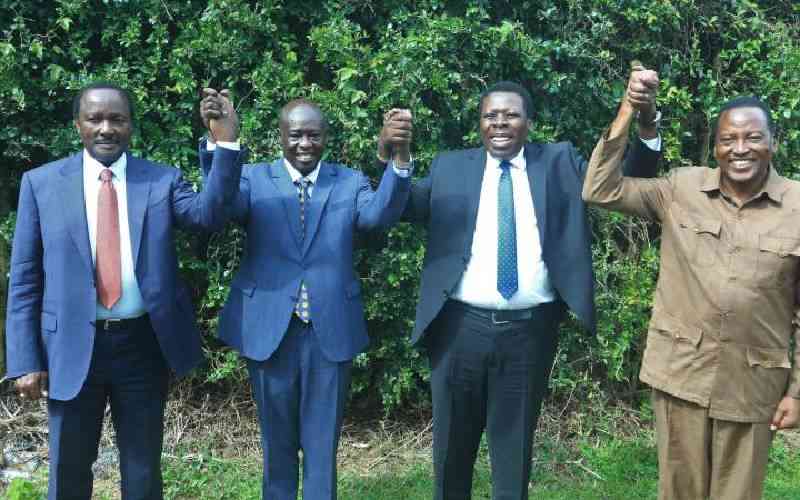“The team seated here is the one that will make Ruto a one-term president.” That was the Democratic Alliance (Kenya) (DAP-Kenya) leader, Eugene Wamalwa, speaking at the opening of his party headquarters in Nairobi, last Monday. The theme of the day was the one-term affair, a refrain that cuts to the quick both President William Ruto and his acolytes.
“No Kenyan president has served only one term, and Ruto will not be the exception,” the renegade Cotu Secretary-General Francis Atwoli says, time and again.
This refrain is frequently echoed across the valley, in the North Rift, by the President’s inner core.
Kapseret MP Oscar Sudi proclaims at public gatherings attended by the President himself, that if need be, they will stuff the ballot boxes, to guarantee a second term.
And William Kamket Kassait of Tiaty talks of removal of term limits. He wants Ruto to rule for 24 years, as President Daniel arap Moi did. An Asiatic businessman somewhere in Turkana yearns for a 25-year tenure for Ruto.
And Nandi Senator, Samson Cheragei, wants the Constitution changed, to give Ruto another 14 years, at the lapse of the current first term. Such is the aspirational philosophical force the Opposition is contending against.
Unyielding detractors
Ruto’s unyielding detractors have styled themselves as the people’s loyal opposition.
Assembled in remnant integuments of a now rickety Azimio La Umoja One Kenya Coalition, they are determined to send him packing in 2027, despite the political machismo and bravado in the president’s camp.
They recognise the shambled character of Azimio after the 2022 elections and could rebirth themselves as a new alliance within the next few days, according to reliable insiders. They could reinvent and repackage themselves as a new outfit with new leadership within this month, perhaps as soon as next week.
Ruto’s impeached deputy president, Rigathi Gachagua, who attended the DAP launch, is the chief priest of the one-term gospel.
He literally speaks to it from church altars, and other holy places, every Sunday. Others are Kisii Senator Richard Onyonka, who represented former Interior Cabinet Secretary Fred Matiang’i, at the DAP event, and of course the de facto Opposition first among equals, Kalonzo Musyoka of Wiper Party, now the presumptive leader of Azimio.
Do they have what it takes to make Ruto a one-term president, or are they just ventilating political bravado and hot air?
Kenya’s Oscar award laureate, Lupita Nyong’o, has famously said that all dreams are valid. How valid is the Opposition’s dream to make Ruto a one-term president? What are the hopes and impediments? Already embarked upon an early campaign mission, President Ruto bragged in Western Kenya a few days ago that he is the ultimate political chess board grandmaster.
Stay informed. Subscribe to our newsletter
ALSO READ: Gachagua, Kalonzo and Wamalwa join forces, vow to make Ruto a one term President
“They are in no way equal to me,” he said to great applause from his disciples, “They are already in panic. They have begun shaking in their boots, saying I have begun to campaign. I haven’t. Just you wait! When I begin, I will whitewash them. And I will arrive fully prepared!”
Deep State
Can the Opposition successfully take on this overly confident president who, when he served as deputy president, successfully turned the tables against his boss, Uhuru Kenyatta? Ruto shocked Azimio when, as the underdog, he beat what was billed “the system” and “the deep state,” with a paltry margin of 248,000 votes.
The actual decisive figure was just under 60,000 votes. This narrow figure was what pushed him across the magical line of 50 per cent plus one vote. He has bragged openly, “If I beat them when they had the system and the deep state, how can they expect to beat me now, when I am in charge?”
Perhaps this is where the emerging formations in the Opposition should train their eyes, over and above the promissory agenda that they hope to place before the country. Whether President Ruto won the 2022 vote free and fair, or whether the election was stolen, as the ODM leader Raila Odinga and his running-mate Martha Karua used to say before Odinga crossed over to join the Ruto government, the facts remain that Ruto beat them. This is especially so when it is considered that the fat cats in the Uhuru government shamelessly brandished the deep state card. The message was that there were no holds barred. Stealing was always a part of the game and, in the manner of speaking, the better stealer won.
If “by any means possible” was sometimes seen to be the Azimio creed, they discovered too late that they had been dealing with a smart fox. This political jungle beast was by far smarter than the jackal that they fielded. Smart to the extent that the mercurial big dog has now swallowed the ODM foxes. They now howl his praises like jungle Sunday school choirs. In 2022 they all wanted to kick him. Now they want to kiss him.
ODM’s Peter Kaluma (Homa Bay Town), Opiyo Wandai (CS Energy), Hassan Joho (CS Mining and Blue Economy), John Mbadi (CS Treasury), and an entire retinue of political hawks and vultures today crow and dance to Ruto’s tune. They caution their conscientious secretary-general, Edwin Sifuna, with the possibility of disciplinary action and undisclosed “dire consequences” if he should remain critical of the Ruto regime as he has steadfastly been doing.
Political cockiness
With Raila and the vanguard of ODM in Ruto’s political bag, it is easy to appreciate the buoyant confidence and political cockiness that the President is swaggering with across the country, and especially in former ODM strongholds.

He now considers them as a part of his base, an assured passport, visa, and ticket to a second term. This is despite the swelling tide of unhappiness in the country.
Infotrack polls reveal a steady decline in the President’s popularity. Ruto’s rankings have fallen virtually everywhere, except within ODM ranks.
Upwards of 80 per cent of Kenyans are not happy with the direction that the country is going, and they blame him.
Yet, here is an upbeat president, with his team talking not just of a second term, but of the possibility of scraping term limits altogether! What chance has the Opposition in its effort to remove this bullish president?
Everything in the country remaining constant, it is easy to see why Ruto’s popularity has plummeted and significant demographics in the country, and not just the Opposition, want him to pack his bags and go.
The Ruto regime has managed the country in an odd manner that presents both a great opportunity and a challenge to the Opposition.
When Kalonzo and his team tell Kenyans that Ruto should go at the end of the present term, they preach to the converted, and the choir.
The most active sentiment in the country is easily organic resentment towards the Ruto regime.
It is largely perceived as an untrustworthy, avaricious and self-serving regime. The country’s Gen-Z youth criticise it for being at once insensitive to the plight of the people, lavish and wasteful in its lifestyle, and arrogant in attitude.
President Ruto arrived on the throne waving a populist manifesto. It was dabbed The PLAN. But The PLAN was cast into the trash can of history, as soon as the inauguration Bible came down at Kasarani.
The President forgot the hustlers on whose back he had ridden to power.
If the talk in 2022 was of a race between two horses, the Ruto hustlers were the veritable horses that carried him to State House. They falsely believed that they would enter into the ornate house with him, only to discover themselves abandoned in a reeking musty horse stable, with not a morsel to eat nor a drop to drink.
The cost of living instantly shot through the roof, to the skies. Punitive and debilitating taxation was instantly introduced, as subsidies on essentials were removed.
As Kenyans began to groan and wail under the heavy burden of the cost of living, the government pleaded for time.
Ruto told his country that he had inherited a heavy debt burden. He needed two years within which he should clear the country’s sovereign debt.
“From now there will be no more borrowing. Just give me two years. Only two years,” Ruto repeatedly told the nation, “I will clear all the debts. Then we will begin spending our own money. The cost of living will drop at once. I have a PLAN. We will never suffer again,” he said, “We must stop using other people’s money!”
The President’s failed promissory agenda, his brass management of the county and overbearing attitude in public is a grand opportunity for the Opposition.
The two years he asked for have come and gone. And what kind of two years have they been?
A season of anomie, normlessness with impunity. A huge mismatch between public expectations and the behaviour of the Executive. He has not paid off the debts as promised.
The cost of living has not dropped. Taxes only grow by the season. Unemployment soars. Hunger pangs bite. Insecurity is on the mount, with homicide, and especially femicide, as a routine affair. All these are crowned with showy profligacy and tactless messaging in the ruling class.
Desperation among the youth led to peaceful demonstrations, which the State countered with heavy, and even fatal, violence.
ALSO READ: Why Ruto risks being a one term president
Young people have been premeditatedly killed in broad daylight by masked State agents. Others are abducted in the presence of their families, never to be seen again.
The Kenya National Commission on Human Rights reports that the State has killed over 50 youth between June and December 2024.
Such is the State that is now on early campaigns, asking Kenyans for a second term. It is also a State that has captured and paralysed Parliament.
The people’s representatives, constitutionally charged with oversight of the Executive and making of laws for the benefit of the public, have become an eager rubberstamp in the hands of the State.
Parliamentarians appear to live in total fear of the Executive. They are trapped in an existential conspiracy of silence against those who elected them. The occasional maverick, like senators Sifuna, Onyonka and Okiya Omtatah, may decry this conspiracy, but the rest wait for the next order from above.
The Speaker of the Senate, meanwhile, justifies the abduction and disappearance of Kenyan youth. He describes them as “bad children who have not been taught by their parents.”
Accordingly, “they must be taught by the world.” The State is the world, and the teaching is abduction, being disappeared, and allied offensives that have been committed against Kenyan youth, either by the State; or at the behest of the State, or as the State has watched. When summoned to appear before the courts over the abductions, law enforcers will defy the orders with trademark impunity.
In rare overreach, the regime in June and July last year deployed the military against peaceful protesters.
Mercifully, Kenya’s soldiers are hugely disciplined. They abstained totally from the atrocious activities that the Executive expected it to engage in the streets.
A less professional military of the kind seen elsewhere in Africa would have lifted the lid to doomsday. But such is the regime that the Opposition is poising itself to dethrone at the next election.
In a word, what could easily pass for a hapless, cruel and self-serving wasteful and arrogant State is offering the Opposition the institution of government, on a silver platter. Governments that violate and brutalise citizens do not get second chances. They finish their terms and go.
Cat-and-mouse games
But this is only if other dynamics do not conspire either to commute their tenures sooner, or to keep them permanently in charge, despite their wretchedness.
Such regimes will especially be removed, if all the changes that they introduce only fail, or hurt the people.
In the Kenyan case, the health sector is in a mess owing to changes that have been veritably forced down the people’s throat.
Moreover, the State is permanently playing cat-and-mouse games with health workers on their pay perks and terms of service, leading to incessant strikes, agony for the sick and loss of life. The country’s teachers, too, are recurrently on strike, once again due to the state failing to honour collective bargaining agreements. University lecturers fall in the same cask. Research funding, university student funding model, and other financial commitments—all these are in shambles.
But shambles describe the public roads network, too. While the Ruto regime has not added a kilometre to the bitumen roads that it found in place, most such roads are getting dilapidated apace. The city of Nairobi leads. It is among the worst hit, with potholes and craters in what have traditionally been exclusive residential suburbs.
Even major highways like the Uhuru Highway-Chiromo Road-Naivasha Road that are gateways into the City are totally broken down. These as State House and City Hall jamboree together, at home and in faraway Dubai, Malta, Monaco, New York, and Isle of Man.
Everything put together, the Ruto dispensation that styled itself three years ago as the people’s government has thus far fallen short of promise and expectation.
It is offering the Opposition the government on a golden platter. At this rate, the 2027 election belongs to the Opposition, but if they want they can lose it. Kalonzo Musyoka, especially, is sitting pretty. His colleagues in the moribund Azimio have given him precedence. Can he harness the opportunity, hold them together soar and sustain the emerging solidarity with him in the saddle? Or will he fumble?
Tribal agenda
Separately, will Ruto and Kenya Kwanza divide them?
Critical players who were previously thought to spell danger to Ruto in 2027 have now been subsumed into Cabinet, to clear the way for the incumbent.
More could be swayed, by incentive or intimidation. In a country whose politics are canvassed through ethnic-based formations and loyalties, when you chip-off one individual, he goes with significant ethnic votes.
Group solidarity and selflessness is accordingly pillar number one for the Opposition. Second, they must counter Ruto’s emerging strategy to recreate the disastrous 2007 ethnic thematic thrust against one tribe.
The Kenyan nation cannot afford to return to that tribal agenda against any one tribe as a political mobilisation platform. But listening carefully to the messaging during the recent presidential odyssey in Western Kenya, you discerned the echoes of 2007 on tribes and tribalism. They must be nipped in the bud.
Third, the Opposition must guard against voter suppression. While they focus on matters Independent Electoral and Boundaries Commission, national registration of the youth, and subsequently as voters must be a priority. And the exercise must be seen to be easy, efficient, free and fair across the country. Already, there are credible fears about opening up of floodgates to foreigners in parts of the country as an election pre-tilting ploy.
It must be investigated for truth value and action. All possible avenues of election slanting, rigging, and stealing before, during and after voting, must be covered if the Opposition truly wants Ruto to be a one-term president.
Finally, Kenyans must be prepared to protect their votes and victory, if they actually turn the tables against President Ruto and his Kenya Kwanza regime.
For now, the election seems to be theirs, to manage to a victorious logical end, or to fumble with and lose. Never before in Kenya was the Opposition offered victory on a silver platter like now.
Dr Muluka is a strategic communications adviser








